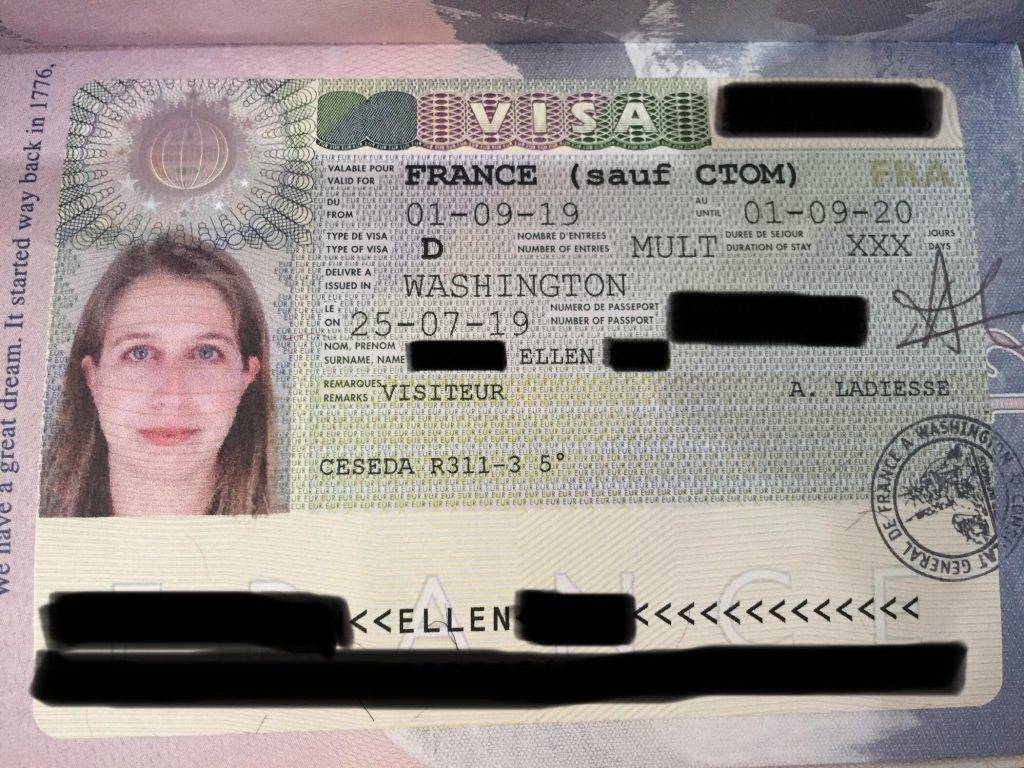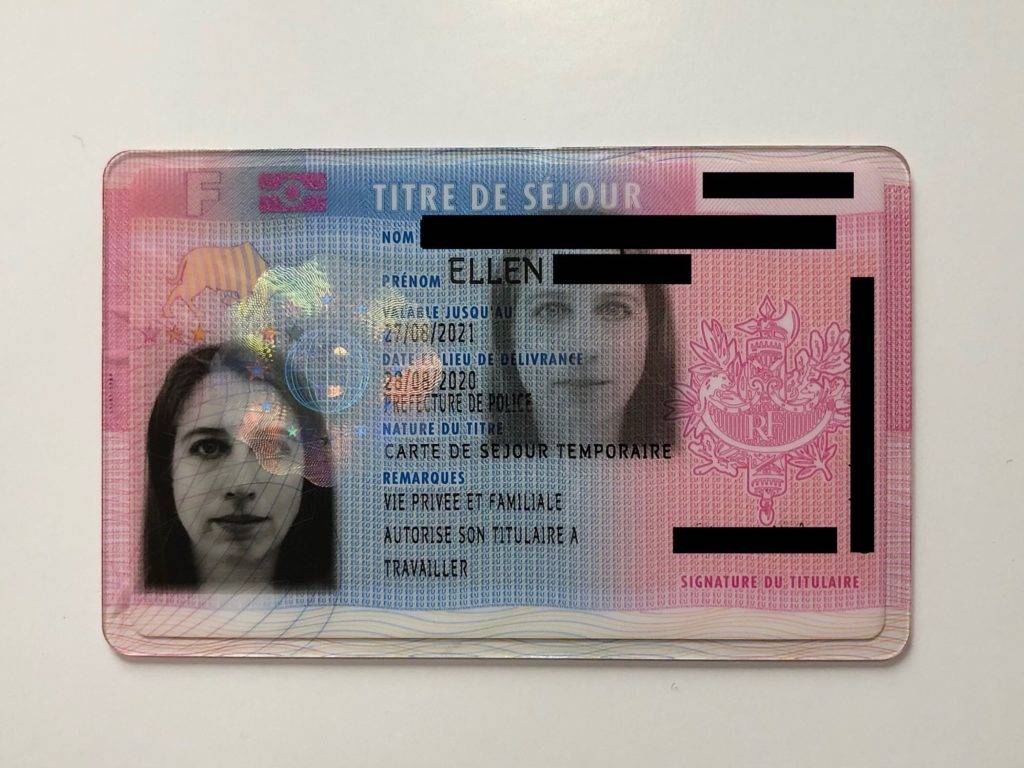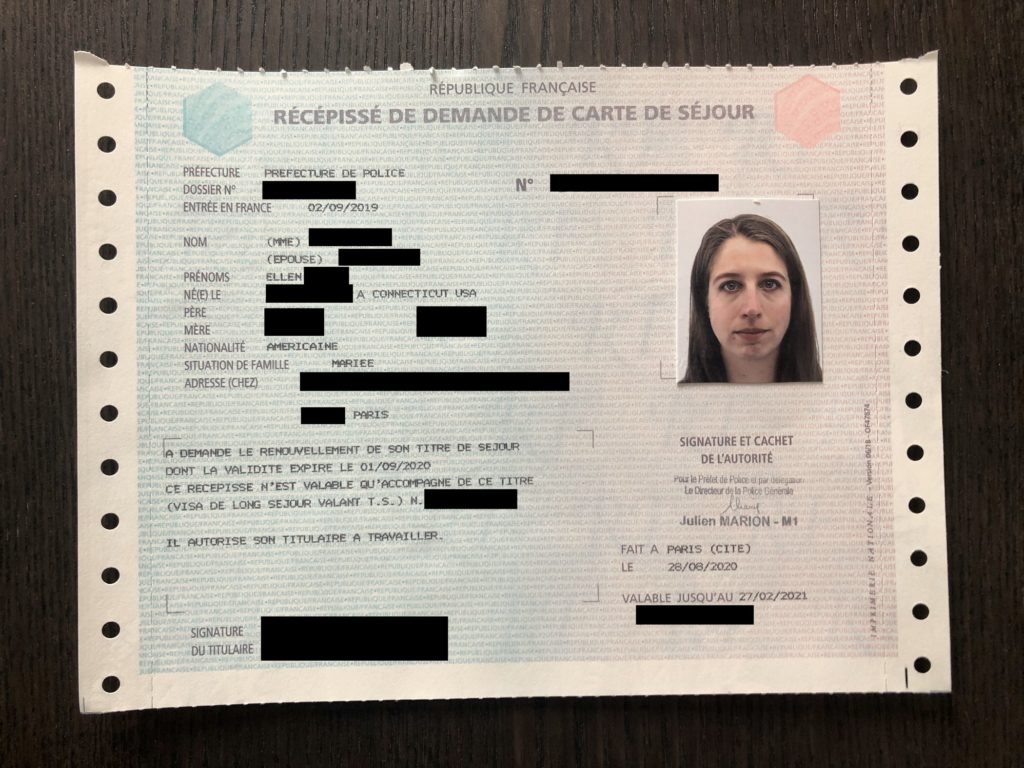This post may contain affiliate links, meaning that if you click and make a purchase, I may earn a commission at no additional cost to you. Read the full disclosure here.
Last updated: July 12, 2024
Visa, titre de séjour, carte de séjour… What’s the difference? I often hear these terms being used interchangeably, but they’re actually different! Here’s a little guide to visas and residence permits for immigrants in France.
Visa for France
A visa is generally issued from your home country (or current country of residence). It is a sticker in your passport that allows you to travel to France and stay there for a defined period of time. There are short-stay visas (90 days or less) and long-stay visas (1 year max). The duration of the visa is related to your reason for being in France.
Official website concerning France visas: france-visas.gouv.fr

Depending on the type and category of visa granted, you might have requirements to fulfill upon entry into France. When I arrived on my long-stay visitor visa, I had to validate it by paying a tax and going to a medical exam.
Each type of visa also comes with its own set of authorizations. For example, on a visitor visa, you are not allowed to work for a French company or solicit French clients, but on a student visa, you can study and work a certain number of hours.
90-Day Visa Waiver
Americans can stay in France (or in any of the 29 countries that make up the Schengen Area) for 90 days out of any 180-day period without a visa. I’ve heard people refer to this rule as a “Schengen visa,” a “passport visa,” and even a “tourist visa,” but for Americans, it’s not a visa at all. It’s an exemption from having to apply for a visa.
➡️ Use the Schengen Short-Stay Calculator to see how many days you have remaining out of your allotment.
Starting in 2025, U.S. Americans traveling to Europe will need to apply to ETIAS, a new travel authorization. ETIAS does not in anyway change the visa-exempt status of visitors who are eligible. As such, it is not considered a visa.
VLS-TS
Visa long séjour valant titre de séjour: This is one of the most common types of long-stay visas. This visa needs to be validated within three months of arriving in France. After validation, it serves as a titre de séjour for the first year abroad. It is a renewable visa, and you would apply for a carte de séjour for your second year in France.
Numéro étranger (AGDREF)
When moving to France, you’ll be assigned a numéro étranger upon validating your visa. Sometimes still referred to as a numéro AGDREF, this number is made up of 9 to 10 digits. Your unique number will remain the same for all renewals and for as long as you continue maintaining residence permits in France.
Having trouble locating your numéro étranger ? You’re not alone 😅 The numéro étranger is in a different spot depending on what kind of document you’re looking at. Use this PDF for guidance.
It’s important to keep track of this number as you’ll be asked for it in any communications regarding your immigration status. This is also the number you would need to use to log into the new online renewal platform.
➡️ Pro Tip: When moving to France, it seemed like the number of log in credentials I needed doubled! My IT techy husband recommended I start using LastPass as my password manager. It’s been a total game-changer in terms of keeping track of and automatically filling in my log in information for me.
Titre de séjour
This is a catch-all term to talk about residence permits, whether it’s a visa in your passport or a physical card. A validated VLS-TS, a carte de séjour, and a carte de résident are all considered titres de séjour.
Carte de séjour
The carte de séjour (CDS) is a physical card that is granted by the French préfecture (in France). You most commonly receive one upon renewing your VLS-TS when starting your second year of living in France.
For a simple renewal, the carte de séjour remains in the same category as your original visa, with all of the same rights, obligations, and restrictions. It is also possible to change categories, depending on your purpose for being in France. For example, I arrived on a visa “visiteur,” but I married a Frenchman, so I later applied for a carte de séjour “vie privée et familiale.”

In some instances, you might apply for your card shortly after your arrival to France, like if you are traveling on a visa “passeport talent.”
Duration of the Carte de séjour
Carte de séjour temporaire—1 year
Carte de séjour pluriannuelle—2 years or more, depending on the category (and the mood of your préfecture!)
Carte de résident
The carte de résident and the carte de longue durée are physical cards that are granted by the French préfecture. This type of card lasts 10 years!!
There are several conditions to meet before applying for this card. In most cases, you need to have lived legally in France for a few years. Some people also need to fulfill a language requirement.
Récépissé
When talking about titres de séjour, a récépissé is a special kind of receipt. It is usually a half-sheet of paper with your photo attached to it.

When you are applying for your carte de séjour, you might get a récépissé at the end of your in-person appointment. This confirms that your documents have been received. Additionally, the récépissé temporarily grants you permission to continue legally staying in France.
A récépissé can be renewed if it is due to expire before your carte de séjour has been printed and collected.
Attestation de dépôt / Attestation de décision favorable
With the new online renewal platform rolling out, submitting documents for an in-person renewal is slowly becoming a thing of the past. More and more categories of titres de séjour are becoming eligible for the online renewal process. For many immigrants, it is no longer necessary to secure a renewal appointment because all supporting documents are uploaded and submitted electronically.
Upon submission of your online renewal application, you will receive an Attestation de dépôt de demande. This is simply a document confirming that your application was lodged. When your application has been approved, you’ll receive an Attestation de décision favorable.
Did this guide help you? Say thanks with a cup of coffee!
Whether you’re able to travel or return to France while your application is being processed depends on the type of document you have.
Hey there, thanks for the info, I’ve just gotten my recepisse and like yours it’s valid for 6 months. But the carte de sejour is meant to be for a year. When your carte arrived was it for a year?
Hi Matt,
The length of the carte de séjour varies and depends on the type of residence permit you currently hold and the type of residence permit you’ve applied for (student/vie privée et familiale/visitor/etc). My first carte de séjour was for a duration of one year but that might not be a helpful comparison for you if your situation is different than mine 🙂
Feel free to provide me with a few more details if you’d like more information.
Best,
Ellen
Hi Ellen,
thanks for the response, i was a visitor but now ive changed to a vie privee et familiale
Well, in that case, your situation is exactly like mine! You can expect a one-year card this time. When you renew, as long as you’ve met all the requirements, you can expect a two-year card.
Congratulations on getting your status change processed!
Thanks Ellen. Best of luck 🙂
this is such a super clear, super helpful post Ellen – thank you. i’ve got a VLS-TS visiteur now (actually expired 1 Sept) w/my CDS appt tomorrow to “renew” but/and apply for VPF, and have got the French Bureaucracy jitters. The form isn’t super clear, nor have I found instructions for it – not even a basic multiple choice for which CDS category I can select from! I appreciate your helping clarify!
Hi Hildreth! I’m happy to hear that this post has helped you out. I also changed from a visitor visa to the VPF carte de séjour, and I listed out all my documents in this post: https://www.americaineinfrance.com/carte-de-sejour-vie-privee-et-familiale-through-marriage/
It’s completely understandable to be nervous before your appointment. Feel free to send me an email if you need more personalized help: https://www.americaineinfrance.com/contact/
In any case, good luck at your appointment 🙂